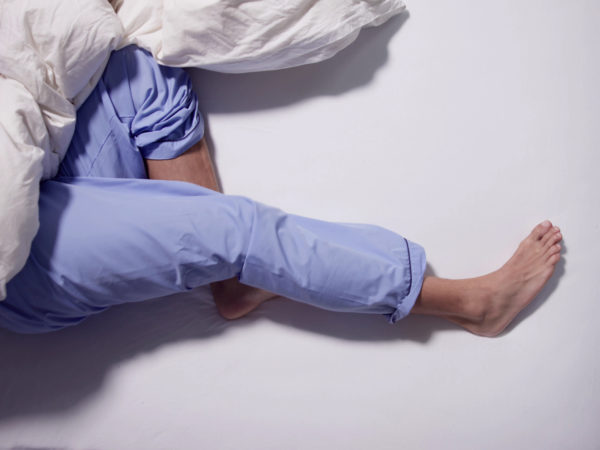Restless Leg Syndrome (RLS)

What is restless leg syndrome?
Restless leg syndrome (RLS) is a condition in which a person feels an irresistible compulsion to move, and involves uncomfortable sensations in the arms and legs while he or she is sitting still or lying down. This discomfort often occurs when the person is trying to sleep and is usually relieved by moving the legs. Often, the discomfort is characterized as an “urge” to move the legs.
What are the symptoms?
The main symptom of RLS is unpleasant sensations in the legs, which have been described as creeping, crawling, burning, or tingling feelings. These sensations typically get worse when the person is sitting or lying down, particularly at bedtime. They can prevent or interrupt sleep, leading to insomnia. Symptoms usually improve when the person stands up or moves his or her legs. Most people with RLS also have a condition called periodic limb disorder, which causes their arms and legs to involuntarily twitch or kick during sleep.
What are the causes?
There is no known cause for RLS, although some researchers believe it may involve an imbalance in brain chemicals.
Who is likely to develop restless leg syndrome?
Certain factors appear to increase the risk of developing RLS, such as:
- Heredity (RLS appears to run in families)
- Age (RLS occurs more often in middle-aged and older adults)
- Pregnancy
- Stress
- Discontinuing sedatives (particularly benzodiazepines such as Valium)
- Using stimulants (including caffeine)
- Other conditions, including peripheral neuropathy, iron deficiency, liver disorders, and kidney failure
How is restless leg syndrome diagnosed?
There is no specific test for RLS. Physicians generally diagnose the condition based on the person’s symptoms and medical history.
What is the conventional treatment for restless leg syndrome?
Treating underlying conditions, such as iron deficiency, may help clear up RLS in some people. Otherwise, conventional physicians may first recommend lifestyle approaches for RLS. These include:
- Warm baths and massages
- Hot and cold packs
- Stress management
- Avoiding caffeine
- Moderate, regular exercise
In some cases, conventional physicians may prescribe medication to help ease RLS, such as:
- Muscle relaxants and sleep medications (Klonopin, Lunesta, Ambien)
- Drugs used to treat Parkinson’s disease (Mirapex, Requip)
- Opioids (Percocet, Vicodin)
- Drugs used to treat epilepsy (Neurotin)
All of these medications can have side effects. Opioids, muscle relaxants and sleep medications can be addicting.
What therapies does Dr. Weil recommend for restless leg syndrome?
As with many conditions that have nonspecific, non-measurable, and variable symptoms, some clinicians have expressed doubt that RLS is a true, clinical syndrome. They point out that restlessness of the legs can have a variety of simple physical and psychological contributors, and pharmaceutical manufacturers have irresponsibly promoted the idea that any sensations of restlessness in the legs usually indicate a disease state.
Dr. Weil sees some merit in this skepticism, and emphasizes that the drugs listed above – many of which have serious side effects – should be employed only as a last resort. In the meantime, these measures may bring relief:
- If you smoke, stop. Smoking may impair blood flow to leg muscles.
- Avoid caffeine and alcohol, both of which can make symptoms worse.
- Take a calcium/magnesium supplement at bedtime. Try 500 mg of calcium citrate and 250 to 500 mg of magnesium to calm nerves and muscles.
- Exercise, stretch or massage your legs (this can help when symptoms are mild).
- Take a hot bath to relax your legs.
- Consider mind body therapies, such as clinical hypnosis and guided imagery, which can help address underlying anxiety.









